A roundtable discussion on President Obama's 2014 year-of-action agenda, the determined GOP opposition, and chances for bipartisan compromise. Joining Gwen: John Dickerson, Slate Magazine & CBS News; Susan Davis, USA Today; Christie Parson, Tribune News; Todd Purdum, Politico & Vanity Fair.
Full Episode: 2014 State of the Union, Obama's Action Agenda and GOP Response
Jul. 07, 2014 AT 5:17 p.m. EDT
TRANSCRIPT
Notice: Transcripts are machine and human generated and lightly edited for accuracy. They may contain errors.
GWEN IFILL:
And the state of the union is strong, divided, frustrated, cautiously optimistic, take your pick. We say all of the above, tonight on “Washington Week.”
PRESIDENT BARACK OBAMA:
(From tape.) That’s why I believe this can be a breakthrough year for America.
REPRESENTATIVE CATHY MCMORRIS (R-WA):
(From tape.) Tonight, the president made more promises that sound good but won’t actually solve the problems facing Americans.
MS. IFILL:
The ritual, the rhetoric, and the respect accorded the annual state of the union address. The president’s priorities – education, higher wages, executive action; Republicans’ priorities – immigration reform, trade, Everyone’s plan to regain political footing before voters go to the polls later this year.
Covering the state of state-of-the-union week: John Dickerson of Slate magazine and CBS News, Christi Parsons of Tribune Newspapers, Susan Davis of USA Today, and Todd Purdum of Politico and Vanity Fair.
ANNOUNCER:
Award-winning reporting and analysis, covering history as it happens, live from our nation’s capital, this is “Washington Week with Gwen Ifill.”
(Station announcements.)
ANNOUNCER:
Once again, live from Washington, moderator Gwen Ifill.
MS. IFILL:
Good evening. Gauntlets were thrown down, heroes were cheered, trash was talked, and then a funny thing happened on the way out of the state of the union: Republicans and Democrats began hinting about getting things done, even if it’s done around the edges. Here’s John Boehner on immigration.
REPRESENTATIVE JOHN BOEHNER (R-OH) [Speaker of the House]:
(From tape.) This problem has been around for at least the last 15 years. It’s been turned into a political football. I think it’s unfair. And so I think it’s time to deal with it. But how we deal with it is going to be critically important.
MS. IFILL:
Then there was the president still talking about moving on without Congress, but not quite as aggressively as before.
PRESIDENT OBAMA:
(From tape.) While Congress decides whether it’s going to raise the minimum wage or not, people outside of Washington are not waiting for Congress and I’m not either. So as a chief executive, I’m going to lead by example.
MS. IFILL:
Lead by example. Give me an example, John.
JOHN DICKERSON:
Well, the examples are pretty small. One of them was he got together the CEOs of a number of large companies – I think it was 300 – and talked to them about the idea of the long-term unemployed.
The White House has been looking at studies over the last several months in the economics shop there, and they find that people who were unemployed for a long period of time are often just as skilled as those who are unemployed for a short period of time, but there is a bias against them because employers look at their résumés and they think, oh, well, if you’ve been unemployed for this long, you must not be that good. And what the president was saying is, no, you should take care to look at these people and do something about it.
Now, that’s not a law that needs to be passed. It’s the president using his persuasive power. And it’s interesting to see him – and this is one of a number of different things he tried to do. He did minimum wage hike for new contracts from companies that work with the federal government. These are minor, small little things, but it’s the president who has – in his sixth year is struggling with who he can persuade. He can’t persuade the Republicans to do much. He’s even having trouble persuading Democrats on things like trade. So he’s trying to persuade anybody he can, using the power of his office, but the things he’s doing are still pretty small.
MS. IFILL:
You know, if you were to rewind the tape to Bill Clinton’s second term, I’ll bet – and we all probably sat around this very table and talked about school uniforms and these small-bore issues that he –
TODD PURDUM:
The V-chip.
MS. IFILL:
Oh, the V-chip, Todd. That’s right. I remember that, which I don’t even remember what it was anymore it was that small. But the point is maybe that’s what presidents have to do. Is that where the White House is? When they say they’re not standing still, Christi, is this what they mean?
CHRISTI PARSONS:
I actually think that’s right. And I think the school uniforms is a good thing to point to because it’s kind of small, but we all remember it, right?
MS. IFILL:
Right. Not the V-chip so much.
MS. PARSONS:
Not the V-chip. I had forgotten. But as the White House was spooling out some of its initiatives this week, they started the drop-off from the minimum wage for federal contractors to, you know, commissioning a study the next day by presidential memorandum was a pretty big drop off.
But it almost starts to seem like the point, right, that there are little things, the president can say, I’m taking action, this is something I can do, and then he goes on to describe the problem in his own terms and says, you know, Congress is – it really takes Congress to make a big, sweeping difference here. I think in the messaging, the smallness of those initiatives is really important to them.
MS. IFILL:
Except that, Sue, Congress didn’t necessarily respond to it very well. What part of the advanced message was that he was going to use his pen and his phone to get things done? I wasn’t certain about the phone part, but I do know that members of Congress were not crazy about the idea that he was going to use the pen and just by fiat, by signature override them?
SUSAN DAVIS:
That’s right. John Boehner, before the state of the union, told reporters that if the president thought he could go around Congress on all these major issues, he was going to run into a, quote, “brick wall.”
Although I think in some ways the state of the union – the preemptive message was that it was going to be a finger wagged at Congress, but he came up with a much more cooperative message. I talked to members after the speech that actually – even Republicans who said they do think there is room to move forward on some substantive issues, even though it’s an election year. Immigration reform is a good example. Republicans took a step this week towards putting something on the table that they can work with. This is the first time since 1994 they might actually make it through the budget season on time.
You know, it’s these little things that we might not necessarily think of, but I was surprised that Republican members coming out and saying, hey, there’re some things we might actually be able to get done this year.
MS. IFILL:
I saw Senator Marco Rubio the next day at a breakfast and he was talking about he pretty much agreed with the president on Earned Income Tax Credit expansion, just doing it a different way. Or there was the MyRA plan which was creating small IRAs for people to encourage saving. Is that the strategy for a second term president, Todd?
MR. PURDUM:
Well, I think the interesting part was the president really had a strikingly upbeat tone. And it wasn’t a hectoring, chiding tone, which is what some of the run-up had suggested it was going to be.
MS. IFILL:
Yeah.
MR. PURDUM:
And so when the Republicans laid out their immigration principles, vague and incomplete as they are, the president offered an olive branch by saying, I wouldn’t necessarily insist on a path to citizenship. That has been kind of a bright line for him in the past. So I think if the farm bill could pass this week, which had been another thing that was stuck forever, I think maybe spring is coming a little early this year in Washington. I don’t know.
MS. IFILL:
We talked about the president’s tone. Let’s listen to what he said, for instance, about that MyRA program.
PRESIDENT OBAMA:
(From tape.) I will direct the Treasury to create a new way for working Americans to start their own retirement savings: MyRA. It’s a new savings bond that encourages folks to build a nest egg.
MS. IFILL:
Now, he couldn’t even quite get that right, but all he has to do is tell Treasury to go do this.
MR. DICKERSON:
This is what’s – here’s the theory behind a lot of these little items that the White House is trying to do. Another thing they’re doing is these manufacturing hubs, this idea that if you put a little money into a geographical area, it will create innovation in public-private partnerships and we’ll get some innovation that leads to economic growth. But he opened two last year – really one and a half; he’s doing six more tiny little things.
What they hope is that by scattering these seeds that the president, through his own power, not always executive orders – people talked about executive orders, but he can do it through memoranda and other things that aren’t executive orders, but nevertheless are an assertion of executive power, that he can scatter these seeds and these little programs will grow and they might gain a constituency. And once they gain a constituency, that constituency will then go to their members of Congress and say, hey, we’d like this to be a permanent thing. And so that’s the MyRA, this new creation, was his attempt to start a little something small and then hope that it gets bigger as it gains a constituency.
MS. IFILL:
But somebody explain to me the distinction between executive action, which is to say MyRA, telling Treasury to go do something, and executive orders, the president himself declaring that something will be done. Is there a distinction to be drawn?
MR. PURDUM:
I’m sure there’s some technical legal distinction, but the fact of the matter is some of the more important things in American history have been taken through executive action or order of one kind or another. The Emancipation Proclamation was an executive action. Harry Truman’s desegregation of the military was done by executive action. There have been all kinds of environmental regulations done by executive action.
MS. IFILL:
In both cases, things that would have never passed legislatively.
MR. PURDUM:
Yes. Or Bill Clinton’s Declaration of National Monuments that couldn’t get status as a national park, he protected them by executive action. So I think there’s a kind of broad tradition of that, frankly in both parties, of doing it. And I think John’s right that the president’s goal is to get enough little kindling out there that somebody might say, this is a fire worth breathing on, you know.
MR. DICKERSON:
And one of the things he did last year was a memorandum to the Department of Homeland Security not to prosecute the children of undocumented immigrants. That was a big deal.
MS. IFILL:
That’s true.
MR. DICKERSON:
That was not through an executive order. It was through a memorandum. What he’s doing now for the purposes of stagecraft is signing big loopy signature on any old thing he can, whether it’s an order, a memorandum or a napkin.
MS. IFILL:
It’s what he did today, I think, actually.
MR. DICKERSON:
It’s to – right. It’s to show that he’s in the game and he’s doing things every day to try and move them.
MS. PARSONS:
And that power is still available to him, you know. He keeps saying that he won’t do anything by executive action or order on immigration, but that’s available to him as is the environmental regulation, which is really the big hammer here that he didn’t – he didn’t detail on Tuesday this – I think because he’s trying to preserve the ability to work with Congress on some other things. But that’s a big hammer that’s out there.
MS. IFILL:
The other thing he wanted to talk about, which he signaled he would in advance – they all did – was this idea of inequality, except this is where people started using different language to describe what they meant, whether it was talking about upward mobility, ladders of opportunity, inequality – but the Republicans are on this too. It’s not just the president by himself.
MS. DAVIS:
No. No. I think they both agree that inequality is a huge issue to address and it’s going to be thematically very significant in 2014. I think the parties have two dramatically different philosophical views as to how that gets done.
Democrats – really all they’ve put forward in this part, even if they’ve given a lot of lip service to inequality being an agenda, is just the minimum wage increase that we’re going to see a vote on later this year. They have not put out a full legislative program exactly how they want to address this.
Republicans in the House, where they control the majority, have passed what they would say are dozens of bills that address this issue that would – but they address it through lower taxes, through less regulation, through job growth and that is where the debate is going to be.
MS. IFILL:
As a matter of fact, let me stop you because I want to listen to one example from the Senate of the alternate point of view about how to define this inequality argument from Senator Mike Lee of Utah.
SENATOR MIKE LEE (R-UT):
(From tape.) But where does this new inequality come from? From government, every time it takes rights and opportunities away from the American people and gives them instead to politicians, bureaucrats and special interests.
MS. IFILL:
That was part of the tea party response to the state of the union speech – there were like four responses to the state of the union speech – but it illustrates very nicely this argument that, yeah, we think inequality is bad too. We just think government is the problem.
MS. DAVIS:
One thing that really struck me that John Boehner said yesterday at the – Republicans had had a retreat this week, is he said we cannot just be an opposition party. We have to be the alternative party.
And I think for so much of the past two, three years, Republicans in Congress have positioned themselves just against Obama. Whatever Obama was for, they were against. And as we go into an election year, they said they’re going to vote on an alternative to the president’s health care law. They’re going to try and put forward their own path on immigration. They’re putting forward their own jobs bills.
And I think part of it was a realization that the constant opposition, the government shutdown was a lesson that they learned from that you can’t just be against things. You have to be for things.
MS. IFILL:
Let’s listen to John Boehner say that and then we’re going to come back and talk about it some more on the other side.
REP. BOEHNER:
(From tape.) In order to maximize our year, it’s important that we show the American people that we’re not just the opposition party, we’re actually the alternative party.
MS. IFILL:
There, he said it.
MR. DICKERSON:
And his number two, Eric Cantor, said the Republicans have to do something about the middle class that’s being squeezed. But these are issues – these are gargantuan issues.
The economy has changed as a result of stagnant wages, globalization and technology. Answering those issues requires cooperation between the president and Congress, even on the question of the Earned Income Tax Credit, which was an effort to get at this question of inequality or social mobility. Changes in the tax code – all the big stuff still requires cooperation.
And so, on the one hand, the president said, this is the defining issue of my remaining time in office, but if you look at the things he’s doing by executive order, action or otherwise, they don’t – they nibble at this problem a little, but to do the big things that get at this problem the president and the Republicans are so concerned about, it still requires cooperation of a kind that I still think, on those big issues, is still a long way away.
MS. IFILL:
Is there any hope or possibility or discussion at all at the White House about cooperation on these issues or is it pretty much let’s just try to keep putting one foot in front of the other?
MS. PARSONS:
They are talking about the possibility of cooperation. That is definitely something that comes up. And it seems like their first order of business is to try to preserve the ability to cooperate on – you know, on several of these things. Housing reform is one thing that keeps coming up. Immigration is a big thing. I mean, that’s – you know, obviously, that’s the major thing that they’d like to move forward on. I think that they’re also thinking very much about the 2014 elections and how this agenda might be useful to fellow Democrats in that, in the campaigns.
MS. IFILL:
I want to talk about immigration because that was the big topic on the plate at this Republican retreat, at least it seemed like it was. They put out principles and the principles are lying there waiting to be acted on. But why is immigration suddenly a Republican issue?
MR. PURDUM:
Well, because John Boehner knows and the people around him, his strategic advisers, have always known what a dangerous issue it is for the Republican Party going forward demographically just as a reality. And we saw, you know, 20 years ago in California, Governor Pete Wilson won reelection by running a vigorous anti-immigration campaign and he ruined his political reputation and ruined the California Republican Party to this day for a generation.
So I think the Republicans have to be awfully careful about this issue as not being seen as obstructionists, not being seen as racist or anti-immigrant, but as being in the great American tradition of if you work hard and play by the rules – the Clintonian phrase – yes, you can get in line and you can have your path to being part of this country. And I think that’s part of what that declaration was about. But you saw how quickly divisive it was.
MS. IFILL:
Well, that’s what I was going to ask Sue about because it was one thing to say, we think we’re going to do something about it. This is a problem. We’ve had this problem for 15 years, as John Boehner said. It’s another thing to – (inaudible) – once again, here we are, getting his caucus to agree.
MS. DAVIS:
Well, I also would like to say that there are draft principles. These aren’t even principles. So they still have a long way to go. I do get the sense that we are seeing –
MS. IFILL:
I’m sorry. What are the principles?
MS. DAVIS:
Roughly in that they – they do not – the big issue always for Republicans has been path to citizenship. I mean, there’s general agreement over border security and enforcing laws. They did not endorse path to citizenship but they have endorsed – theoretically where the undocumented could have the pathway to legal status. And they have endorsed a DREAM-like type – DREAM Act type like proposal that would allow citizenship for children, which is a big step for them.
MR. PURDUM:
Brought here without their say.
MS. DAVIS:
Right, the children that had no choice of their own. I do think we are seeing in some ways a rise of or a revival of compassionate conservatism, particularly when we’re seeing this around the issue of immigration.
One other thing that struck me among Republicans that I talked to at the retreat this week was that they were saying that saying – even ones that don’t want to do an immigration bill were saying things like, we cannot be seen as this party that wants to round people up and take them out of the country. We cannot be seen as a party of intolerance. So I think they’re very aware of the damage that this debate has done to them, even the ones that may not necessarily want to vote for this in the end.
MS. IFILL:
And the White House, the president particularly seems to be saying, I’ll lead from behind on this. I’ve been out front before and it doesn’t ever help, so –
MS. PARSONS:
Yeah. I was just going to ask what you think about that because the White House has been saying that a lot this week, we’re staying out of this. We don’t want to do anything to kind of get in their way. So even today, you saw the president say – you know, there was a CNN interview, which aired, in which he stepped away from his bottom line of path to citizenship.
But the White House is still saying the president’s point of view is still the same, his bottom line is still the same. He just doesn’t want to mess up Congress. So I’m just curious if people think that’s actually a strategy that makes a difference.
MS. DAVIS:
The one thing I would say is that two things we’ve seen this year in the budget deal and the farm bill is that Congress has identified the governing coalition. They have figured out how to get bipartisan majorities in both chambers, in both parties to get it done. And if they’re going to do an immigration bill, that is roughly the group of lawmakers that will do it.
And I think both parties have shown a willingness to buck their bases; the right has shown it with the tea party base; the left has shown it among the liberal base, which is smaller and protect – not as contentious, but they know who they are. So they’ve identified them and the question is whether they can do it on this issue.
MR. DICKERSON:
And one thing: as we see the president learning in office one thing he’s learned, and John Boehner has told him this, is that there are some issues where you have to keep your hands off because the minute you say you want to do something, I lose some of my Republicans, who now don’t like it because you like it.
And so, in some sense, we think of an activist president in there, you know, twisting arms. It may be a sign of smarts and learning that the president is stepping back. And politically that works for him OK too because if Republicans get into a big fight among themselves about immigration, he can let that play out and that doesn’t hurt the Democrats.
MS. IFILL:
But on this issue – but not on every issue – on the debt ceiling, the president’s been pretty certain that he is not going to accept any kind of riders, anything to muck it up. He’s not going to – that’s no deal. Also, on Iran sanctions – the president has said, you know what? They send me a bill tacking more sanctions on this before diplomacy has run its course, I’ll veto it. So there are some cases in which this president seems like he’s willing to push back.
MR. PURDUM:
Yes, I think that’s true. And when he said that about the Iran sanctions, all the steam immediately went out of whatever was left to try to pass tougher sanctions, especially in the Senate. And on the question of the debt ceiling, yes, he said, I won’t negotiate over the debt ceiling, and the Republicans for their part are saying, we don’t want to give you a clean debt ceiling, but default is unthinkable. And they were not saying, you know, last fall that they were in quite that. So I think there might yet be a deal on that too.
And the thing about the president’s strategy at the moment, I think it’s useful for him to keep people guessing a little bit about just what his bottom line is on some of these things, especially immigration.
MS. IFILL:
You know, one of the things he’s keeping everybody guessing on is the Keystone pipeline. Today, the State Department came out with yet another in its incremental steps toward maybe potentially recommending approval. Is that something that people on the Hill are waiting on?
MS. DAVIS:
They certainly have the votes to pass it if they get to it. The reason why I think this could be the year for the Keystone pipeline really doesn’t have anything to do with Republicans. It has to do with Democrats. And there’s a lot of Democrats in the Senate running for reelection in conservative states, where this Keystone pipeline is very popular. That’s seen as a jobs measure and could really help a lot of senators in difficult states.
MR. PURDUM:
Mary Landrieu, Mary Landrieu, Mary Landrieu, Mary Landrieu.
MS. DAVIS:
Mary Landrieu.
MS. IFILL:
Mary Landrieu.
MS. DAVIS:
And Mark Begich in Alaska and places that are, generally, politically very open to the idea of oil jobs, pipelines and all of that.
MS. IFILL:
OK. So let’s step back a moment. And at the state of the union speech week, we’ve all spent a lot of time many years covering them as big events, but are they? And do they deserve to be anymore? They are laundry lists. We know they are. There’s the sitting up, standing down, doing this, the ritual. There’s someone sitting in the box with the first lady. I don’t know.
MR. DICKERSON:
The form is exhausted. But I think if a president can’t be creative enough to change this form, over which he has lots of control, to make it say a single issue – the governor of Vermont, in his state of the state address said, there a lot of things I can talk about but I want to talk about one issue, which, in his case, was the problem of heroin in his state. But by focusing on a single issue, he brought everybody’s attention to it.
A president can – if he shows creativity in that speech, perhaps he can show creativity in all the other modes of his office that require a little bit of new thinking. But the form as it stands now is perhaps the most imbalanced between that – the silly pomp and the stroking of the ego and the actual substance of what comes across.
MS. IFILL:
But I wonder if that’s even possible. We know what the structure is of a state of the union speech – a million authors, everybody wants – they negotiate for months to get one line in the speech. And it’s almost so hidebound that I wonder if it’s possible to change it is how much attention and effort is put on it.
MS. PARSONS:
Yeah. I wonder about – I wonder if the form is evolving, actually, because, you know, whereas people used to spend a week chewing over what was, you know, the substance of the state of the union address, people are moving on – you know, the next news cycle they’re chewing over something else.
So the president – I know it’s not unusual for the president to go out on the road and start making a pitch for his agenda. But really, we couldn’t get some real basic information about the things he was proposing during the – during the two days around it until –
(Cross talk.)
MS. IFILL:
He couldn’t tell you how many people were affected by this minimum wage.
MS. PARSONS:
Right. Right. (So we ?) don’t really know that. But that’s supposed to be forthcoming. We didn’t understand this MyRA or My IRA or how – not even how to pronounce it actually, but we didn’t know basically how it worked until he went, and, you know, did his event in (Washington ?).
MS. IFILL:
And does Congress even expect that?
MS. DAVIS:
Expect for him to –
MS. IFILL:
That speech, do they have expectations of anything else other than the show?
MS. DAVIS:
I think in some ways – I like the state of the union because I think that it’s not necessarily about the people in the room. I think it’s this rare opportunity where people across the country, across political persuasions actually tune in and pay attention to the president for this one brief moment. And I think there’s merit to that.
I do think that this sort of theater of the state of the union can be a little – you know, it’s so overdone, although I think that there’s also different ways people are watching and participating with it now. I think one other thing that was interesting about how the White House was really encouraging people to watch online, and I do think this White House in particular is thoughtful of the modernization of the media and how people are listening to the president, and they’re clearly trying to make sure that people are still listening.
MS. IFILL:
Yeah. They were tweeting pictures of the dogs listening to the radio earlier. But the headline in your piece, Todd, was “Make It Stop.”
MR. PURDUM:
Well, the other dirty little secret is that we in the media have helped this phenomenon by effectively monetizing the state of the union. We’ve created all kinds of events.
MS. IFILL:
How? Let me know.
MR. PURDUM:
Watching events, watching – you know, after parties, discussions with the experts the next day. And, I mean, in some ways, it’s like the White House Correspondents Association dinner. It’s just –
MS. IFILL:
No, it’s not. (Laughs.)
MR. PURDUM:
Well, in the sense that it’s gotten – it slipped the rails a little bit of its original goal. But I do find it quite depressing, this notion that if your particular issue didn’t get mentioned, you’ve lost. I got an e-mail on Wednesday morning from – my mother happens to have Alzheimer’s and I got an Alzheimer’s e-mail saying, we’re so sorry that he didn’t mention this last night. I’m like, you can’t mention everything.
MS. IFILL:
And it’s not going to really affect anything else if he mentioned it, except the lack of mention, I suppose.
MR. DICKERSON:
Although I’ve been talking to trade reporters about an issue I won’t go into here, but the number of times they mentioned the – I want to keep the viewers awake, but the number of times people I talk to in the reporting said, well, he said this in the state of the union. It still has that –
MR. PURDUM:
Talismanic effect.
MR. DICKERSON:
Yeah, talismanic effect. And although –
MS. IFILL:
And it’s also a way of holding him – his feet to the fire on issues.
MR. DICKERSON:
Right. But, in the end, it doesn’t really hold his feet to the fire, and so that’s why it needs to be rethought. These prison bars of laundry lists and all that – they’re of his own making, the president’s.
MS. IFILL:
Let’s break free and do something new. He’s not running for reelection. This is the time, right?
MR. DICKERSON:
Any president, the next one maybe.
MS. IFILL:
Any president. Well, thank you. Now, take that advice, White House. Never mind. We weren’t giving you advice. We were just talking.
We have to stop here for now. But the conversation continues online on the “Washington Week” webcast extra, where we will talk about the bill Congress passed this week that really could change your life and also about Chris Christie. It streams like at 8:30 p.m. Eastern Time or you can catch it all week long at pbs.org/washingtonweek.
Also online, my post-state of the union take on “Butterflies, Rainbows and Midterm Political Reality.” Isn’t that good? Keep up with daily developments now seven days a week on the PBS “NewsHour.” And we’ll see you right here next week on “Washington Week.” Good night.
FROM THIS EPISODE

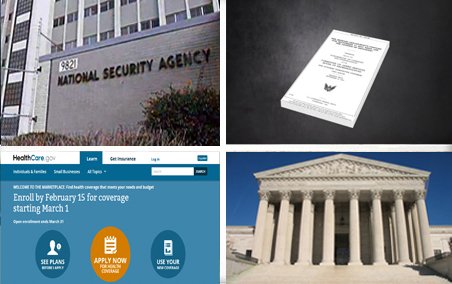
Full Episode: NSA Reforms, Benghazi Probe, ACA Political Fallout

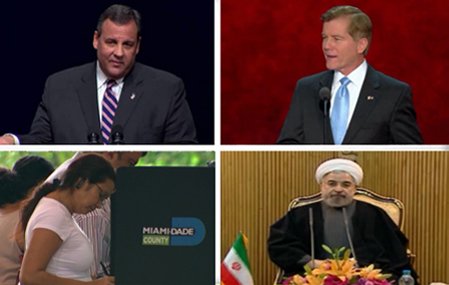
Full Episode: Christie Saga Continues, McDonnell's Downfall, Election Reform and Syria Peace Conference

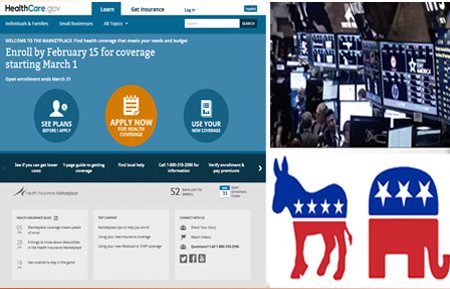
Full Episode: Healthcare & Jobs, Economic Jitters and 2014 Election Strategies

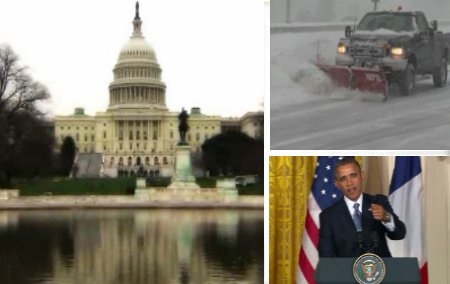
Full Episode: Obama's Clean Debt Ceiling Bill, Obamacare Delays & GOP 2014 Strategy


Full Episode: Ukraine Erupts, Minimum Wage, 2014 Election Spending & Races To Watch

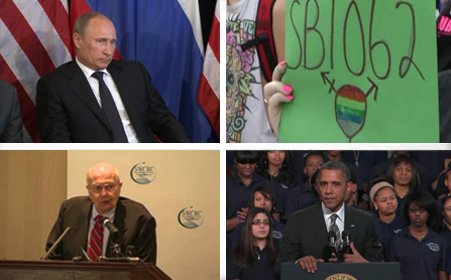
Full Episode: Ukraine Uprising, Equal Rights for LGBT community, Dingell retirement, My Brother's Keeper

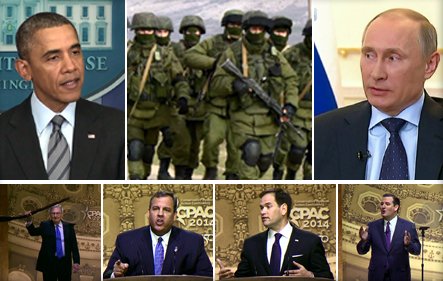
Full Episode: U.S. considers sanctioning Russia over Ukraine crisis & conservatives rally in Maryland

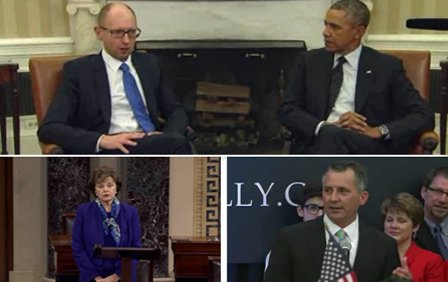
Full Episode: Russia-Ukraine Standoff, Feinstein vs CIA and Florida's Special Election Review

© 1996 - 2026 WETA. All Rights Reserved.
PBS is a 501(c)(3) not-for-profit organization
